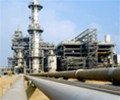

The Shanghai Petroleum and Natural Gas Exchange on Wednesday launched a spot pricing index for liquefied natural gas imports, the first marker of its kind in China as the world’s top buyer seeks greater global pricing power over the key energy source.
China, where natural gas consumption is fast expanding, should have its own pricing mechanism to better reflect local market fundamentals, government officials said at a seminar in Shanghai that was broadcast online.
“Currently, China’s imports are primarily linked to foreign indexes that don’t reflect Chinese demand and supply, and we’re passive recipients of those prices,” said Wang Zhiqiang, an energy official with Shanghai Development and Reform Commission.
The state-backed exchange will start publishing daily fixed-price quotes later on Wednesday for spot imports of deliveries over the next three months, said an exchange official.
The index, in U.S. dollars per million British thermal units (mmBtu), will track prices on a delivered, ex-ship basis for shipments of between 90,000 and 210,000 cu m of LNG.
The index will be a joint effort with the General Administration of Chinese Customs, which tracks China’s LNG imports on a weekly basis.
The Shanghai oil and gas exchange said earlier a China-based spot price had the support of top state majors like PetroChina 0857.HK, Sinopec Corp 0386.HK and China National Offshore Oil Corp, as well as that of non-major importers.
Separately, Wang Fenghai, president of the Shanghai Futures Exchange, told the Platts Asia Pacific Petroleum Conference on Tuesday his exchange was accelerating preparations for the launch of natural gas futures as its next key product, although he did not give a timeline.
The global gas market’s prevailing benchmarks include Netherlands’ Title Transfer Facility, or TTF, and Asia’s Japan-Korea Marker, or JKM, and U.S. Henry Hub prices.
The launch of the Shanghai quotes comes as Asian gas prices hover near record highs of more than $32/mmBtu JKMc1 and at record highs in Europe TRNLTTFYc1, driven by thin inventories in the West and demand growth in Asia, primarily out of China.
China has overtaken Japan as the world’s largest importer of LNG earlier than expected. China’s January-August imports were up nearly a quarter from a year earlier at 51.8 million tonnes, on demand from industries and power generation, analysts said.
Japan’s imports for that period were 51.4 million tonnes.
Source: Reuters (Reporting by Chen Aizhu; Editing by Tom Hogue)